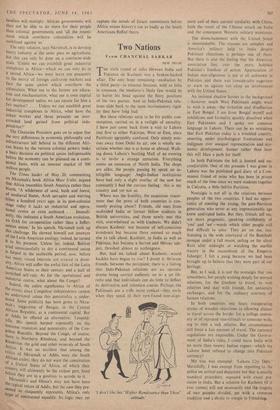Two Nations
From CHANCHAL SARK AR
NEW DELHI
THE sixth round of talks between India and Pakistan On Kashmir was a broken-backed affair. The only hope remaining—mediation by a third party—is tenuous because, with so little in common, the mediator's likely fate would be to batter his head against the flinty positions of the two parties. And so Indo-Pakistan rela- tions slide back to the same recriminatory rigid- ity they have long had.
But these relations seem to be for public con- sumption, carried on in a twilight of unreality. I have just come back from a visit to Lahore (my first to either Pakistan, West or East, since Partition) agreeably confused. Only ninety min- utes away from Delhi by air, one is wholly un- certain whether one is at home or abroad. Walk- ing down Lahore's bustling Mall of an evening is to invite a strange sensation. Everything seems an extension of North India. The shops are alike; the people passing by speak an in- telligible language; Anglo-Indian institutions have had only a slight overlay of the new but constantly I had the curious feeling: this is my country and yet not so.
Where was the hostility, the suspicious resent- ment that the press of both countries is con- stantly prating about? Friends, old ones from undivided India or former fellow students in British universities, and those newly met this visit, overwhelmed us with kindness. We didn't discuss Kashmir, not because of self-conscious avoidance but because there seemed so much else to talk about. Kashmir, in India as well as Pakistan, has become a barren and fibrous sub- ject, threshed almost to nothingness.
But, had we talked about Kashmir, wou'd hackles have begun to rise? I doubt it. Bezween friends, between the percipient, there is a feeling that Indo-Pakistan relations are an operatic drama being carried endlessly on to a set lib- retto and that individuals can do little to deflect its destructive and relentless course. Perhaps the Pakistanis are a trifle more cynical--they smile when they speak of their new-found non-align-
'I don't like his "Higher Renaissance than Thou" attitude.'
ment and of their current cordiality with China, both the result of the Chinese attack on India and the consequent Western military assistance.
The disenchantment with the United States is unmistakable. The reasons are complex and America's military help to India despite Pakistani objections is perhaps one of them But there is also the feeling that the American association has, over the years, hobbled Pakistan's freedom of action. Appreciation of Indian non-alignment is not at all unknown in Pakistan and there was considerable eagerness to warn us against too close an involvement with the United States.
An insistent shadow hovers in the background —however much West Pakistanis might want to wish it away—the irritation and disaffection in East Bengal. I am from Bengal myself and inhibitions and formality quickly dissolved when East Pakistanis and I spoke our common language in Lahore. There can be no mistaking that East Pakistan today is a troubled country, smarting under psychological frustrations and indignant over unequal representation and eco- nomic development. Sooner rather than later this will blast a path for itself.
In both Pakistans the left is hunted and un- comfortable. One of the presents I was given in Lahore was the published gaol diary of a Com- munist friend of mine who has been in prison much of the time since we were students together in Calcutta, a little before Partition.
Nostalgia is not all in the relations between peoples of the two countries. I had no oppor- tunity of meeting the young, the post-Partition generation who never at any impressionable age knew undivided India. But they, friends tell me, are more pragmatic, speaking confidently of 'you' and 'we'—words which older people still find difficult to utter. They jar on me, too. Standing in the wide courtyard of the Badshahi mosque under a full moon, sailing on the silent Ravi after midnight or watching the marble tracery in the mausoleum of the Emperor Jahangir, I felt a pang because we had been brought up to believe that they were part of our heritage.
But, as I said, it is not the nostalgia that one remembers, but people wishing deeply for normal relations, for the freedom to travel, to visit relatives and stay with friends, for university exchanges, and for the ordinary courtesy of human relations.
In both countries one hears exasperating stories of wooden objections to allowing alumni to travel across the border for a college centen- ary or of repeated visa-refusals to someone wish- ing to visit a sick relative. But circumstances , still force a fair amount of travel. The currency regulations are impossible. Under the Govern- ment of India's rules, I could leave India with no more than twenty Indian rupees—which my Lahore hotel refused to change into Pakistani currency!
My visa was stamped: 'Lahore City Only.' Mercifully, I was exempt from reporting to the police on arrival and departure but that is usually standard procedure. repeated with exact pre- cision in India. But a solution for Kashmir (if it ever comes) will not necessarily end the tragedy of two peoples divided, yet with a common tradition and a desire to mingle in friendship.


































 Previous page
Previous page